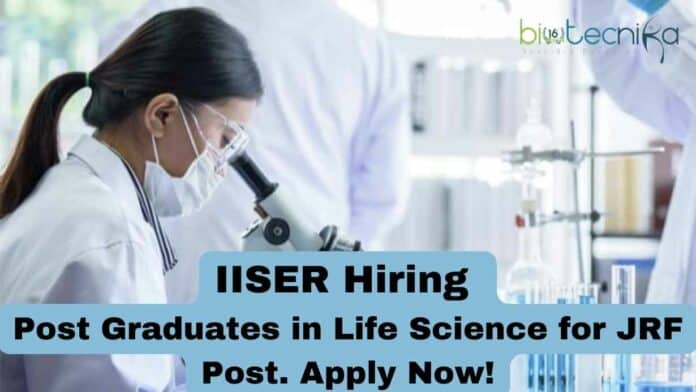IISER TVM Hiring Life Science For JRF Post – Apply Now!
The Indian Institutes of Science Education and Research (IISER) are currently seeking highly motivated postgraduates in the field of Life Science to apply for the Junior Research Fellow (JRF) position. This exciting opportunity offers a platform to engage in cutting-edge research and contribute to the advancement of scientific knowledge. Don’t miss the chance to be a part of the dynamic research community at IISER.
Name of Post: Junior Research Fellow
Name of Project: Elucidating the mechanisms of nutrient acquisition by liver-stage Plasmodium.
Funding agency: Department of Health Research, Ministry of Health and Family Welfare.
Location: Thiruvananthapuram
Institute: IISER
The minimum educational qualification required (as prescribed by the funding agency):
- Post Graduate Degree in any discipline of Life Sciences/ Microbiology/ Biochemistry/ other relevant subjects. Scholars selected through a process described through any of the following: Scholars/fellows who are selected through National Eligibility Tests- CSIR/UGC NET or GATE qualified. The selection process through National Level Examinations conducted by Central Government Department and by their agencies such as DBT, DST, DAE, DRDO, MHRD, ICAR & ICMR etc. Preference Research experience in NMR, pathogen associated studies and/ or animal handling will be preferred.
Number of posts:
1Fellowship amount: Rs.31,000/- + HRA
Tenure of the post: 3 years
Age: Upper age limit is 30 years on last date of application with age relaxation as per Govt. Rules.
Last date: 25th September 2023.
How to apply: The following documents should be merged into a single pdf and sent to [email protected]. Email subject: “JRF Position” Name of the pdf file: “JRF Position name”. Recent CV, Statement of purpose (not more than ½ page) , Bachelor’s and Master’s certificates with marks.
IISER TVM Life Sciences JRF. The possible interview Q & A to help you with:
Question: What motivated you to apply for this specific research project on Plasmodium nutrient acquisition in the liver stage?
Answer: I have always been passionate about malaria research due to its global health significance. This project particularly piqued my interest because understanding the mechanisms of nutrient acquisition by Plasmodium in the liver stage is a critical step in developing effective interventions against malaria. I believe my background in life sciences equips me well to contribute to this research.
Question: Can you describe your relevant research experience or skills that make you a suitable candidate for this JRF position?
Answer: During my postgraduate studies, I conducted research in molecular biology and parasitology, which included working with intracellular pathogens. Additionally, I have hands-on experience with techniques such as cell culture, microscopy, and molecular assays that are essential for investigating nutrient acquisition mechanisms. My prior research and skill set align well with the requirements of this project.
Question: The liver stage of Plasmodium is relatively understudied compared to the blood stage. What challenges do you anticipate in elucidating nutrient acquisition mechanisms during this stage?
Answer: Indeed, the liver stage presents unique challenges due to its intracellular nature and limited accessibility. I anticipate difficulties in isolating and studying liver-stage Plasmodium parasites. However, with the right methodologies, such as advanced imaging techniques and in vitro liver cell culture systems, we can overcome these challenges to gain valuable insights into nutrient acquisition.
Question: Research often encounters setbacks. Can you provide an example of a research challenge you faced in the past and how you approached it?
Answer: In a previous project involving drug resistance in parasites, we encountered unexpected variations in response to treatment. To address this, I conducted thorough troubleshooting, verified experimental conditions, and sought guidance from mentors. Ultimately, this process led to the discovery of a novel resistance mechanism, highlighting the importance of perseverance and rigorous troubleshooting in research.
Question: Collaboration is crucial in scientific research. How do you envision collaborating with other researchers or departments at IISER to advance this project?
Answer: I see collaboration as a key driver of success in scientific research. I plan to actively engage with experts in related fields at IISER, such as cell biology and computational biology. By sharing insights, techniques, and data, we can approach the complex problem of Plasmodium nutrient acquisition from multiple angles and make significant progress in understanding this critical aspect of malaria biology.
Editor’s Note: IISER TVM Life Sciences. Please ensure you are subscribed to the Biotecnika Times Newsletter and our YouTube channel to be notified of the latest industry news. Follow us on social media like Twitter, Telegram, Facebook






























